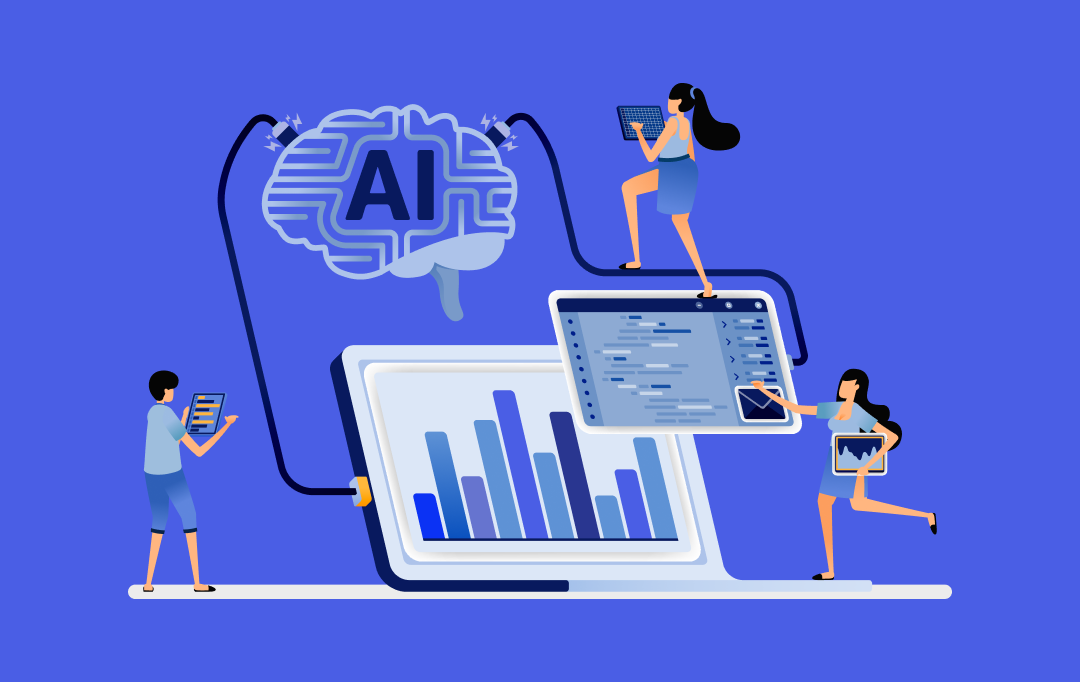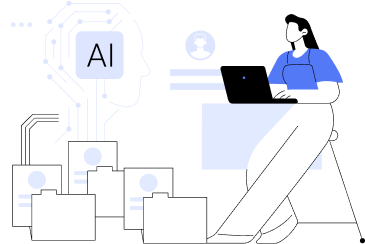- Discovering The Current State of Enterprise AI
- Figure Out AI's Sweet Spot in Your Industry
- Checklist to Ensure Your Business Is Ready for AI
- How to Integrate AI in Your Enterprise: 9 Integral Steps to Succeed
- 1. Assess Your Current Technological Infrastructure
- 2. Identify Business Goals and Align AI Solutions
- 3. Build or Upgrade Your Data Strategy
- 4. Invest in Talent and Skills Development
- 5. Adopt Agile and Scalable Development Practices
- 6. Ensure Strong Leadership and AI Governance
- 7. Prepare for Change Management
- 8. Pilot AI Projects and Scale Gradually
- 9. Continuously Monitor and Improve AI Systems
- How to Overcome Common Enterprise AI Integration Challenges
- Maximize AI Readiness & Integration in Your Enterprise with Appinventiv’s Excellence
- FAQs
Key takeaways:
- Successful AI integration in business starts with clear business targets, not flashy tech. Figure out what problem you’re actually solving first.
- Your AI performs only as well as your data. Strong data governance strategy ensuring clean, accessible, secure data becomes absolutely essential for enterprise AI integration.
- AI adoption challenges people as much as technology. Building AI-ready culture through training, communication, and solid leadership becomes crucial for beating resistance.
- Start Small, Scale Smart. Begin with targeted pilot projects to demonstrate value and learn key lessons before a full-scale enterprise AI deployment strategy.
Let’s be clear: the era of “AI as a shiny new product” is fading. The true value for enterprises comes from weaving AI into the fabric of your existing workflows, making it an enabling feature that quietly powers smarter, faster, and more efficient operations.
Here’s a cautionary tale that’ll make you think twice. A Fortune 500 manufacturing giant threw $15 million at an AI-powered predictive maintenance system. Sounds smart, right? Well, six months later, they discovered their legacy infrastructure couldn’t handle real-time data processing. The project was shelved, not because AI failed, but because integration wasn’t planned from the ground up.
This is not just a fictional story but the reality for many. According to RAND, over 80% of AI projects fail twice the rate of regular IT projects (RAND, 2024). The culprit? Rushing into AI without building the right foundations.
Thankfully, the scenario is shifting now. Enterprises are moving from “let’s do AI because it’s hot” to “let’s use AI to solve real business challenges.” Understanding how AI can address your unique business needs is the first step in preparing your enterprise AI integration readiness strategy.
Ensure your business doesn’t fall into that category. Crafting a solid AI strategy tailored to your needs now.
Discovering The Current State of Enterprise AI
Let me paint you the real picture. According to McKinsey’s latest survey, 78% of organizations used AI in at least one business function in 2024 (McKinsey 2025). That’s up from 72% earlier in the year and 55% the year before. Sounds impressive, doesn’t it?
Before diving into AI integration strategies, business leaders should consult a practical guide to generative AI adoption to understand how this technology differs from traditional AI implementations.
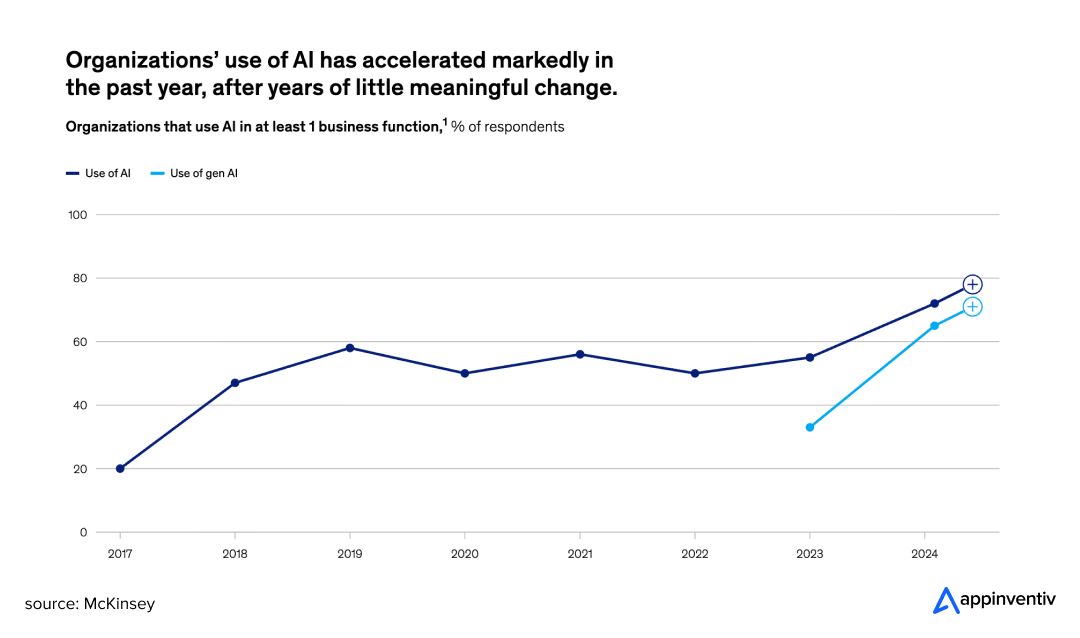
But hold on, there’s more to this story. While adoption rates are climbing, the success rates tell a different tale. MIT’s recent research found that 95% of generative AI pilots at companies are failing (Fortune, 2025). That’s a massive gap between trying AI and actually making it work.
Here’s an important lesson from companies excelling at AI integration for enterprises: they didn’t rush the process. They dedicated months, sometimes over a year, carefully refining their data architecture before rolling out AI solutions.
Take this retail example. Company A invested heavily in generative AI integration for enterprises to automate customer service, but struggled because their data formats were inconsistent across different regions. Meanwhile, Company B took eighteen months to standardize its data infrastructure first. The result? They saw a 40% improvement in customer satisfaction scores within six months of AI deployment.
The difference? Understanding that AI integration in business operations isn’t just about adding new tech; it’s about transforming how your entire organization operates.
Figure Out AI’s Sweet Spot in Your Industry
Before jumping into AI implementation strategies, you need to first figure out how AI integration in your specific sector actually creates value. This isn’t cookie-cutter stuff. Check it out:
- Healthcare organizations use AI for diagnostic accuracy and predicting patient outcomes.
- Financial services companies use AI for fraud detection and algorithmic trading.
- Tech companies often roll out AI for code optimization and personalizing user experiences, which directly hits their product development cycles and customer engagement.
- Manufacturing businesses use AI for predictive maintenance and supply chain optimization.
- Retail businesses count on AI for inventory management, personalized recommendations, and customer service chatbots, pumping up sales and customer satisfaction.
- In real estate, AI gets used for market trend analysis, property price prediction, and enhancing client interactions, helping firms make smarter investment decisions.
The big insight here? Successful enterprise AI integration strategies must align with the specific challenges and opportunities in your industry. Generic AI implementations rarely deliver game-changing results because they don’t tackle the unique requirements of your sector’s business processes.
Also Read: Enterprise AI Integration Examples: How Top Companies Use AI
Checklist to Ensure Your Business Is Ready for AI
To determine if your organization is ready for AI, you’ll need to conduct a thorough assessment of your current capabilities. Here’s an AI integration checklist for businesses to consider. The more boxes you can check, the smoother your implementation will be.
| Readiness Area | The Real Question | Why You Can’t Ignore It |
|---|---|---|
| Clear Use Case | Have you identified a specific area where AI can add value, like automation or personalization? | Without a clear use case, AI becomes a random experiment rather than a strategic tool for business improvement. |
| Relevant Data | Do you have clean, structured, and accessible data for AI models to work effectively? | AI thrives on quality data; without it, AI models can’t provide meaningful insights or accurate results. |
| Tech Stack | Can your existing systems support AI tools and models with scalability in mind? | Your infrastructure must be robust enough to handle AI models and scale as demands grow. |
| Talent | Do you have in-house AI expertise, or can you access external specialists? | AI requires specialized skills. Without the right talent, your AI initiatives are likely to fall short of their potential. |
| Leadership Buy-In | Is management aligned with and committed to supporting AI adoption strategy for enterprises? | Executive buy-in ensures that AI projects are prioritized, aligned with broader business objectives, and properly resourced. |
| Governance | Are there ethical guidelines in place to govern AI usage, ensuring responsible deployment? | Clear governance ensures AI is deployed ethically, avoiding risks related to bias, privacy violations, or non-compliance. |
| Internal Ownership | Is there someone in your organization leading the AI project, coordinating teams, and measuring progress? | Strong leadership is essential for maintaining focus, managing cross-functional teams, and tracking project milestones. |
| Budget | Do you have allocated funds for AI tools, training, or external consulting? | AI implementation often requires significant investment in technology, expertise, and support services. A budget ensures this. |
| Openness to Change | Are you prepared to adjust processes to make AI work instead of forcing AI to fit outdated systems? | AI adoption requires flexibility in operations; sticking to rigid processes could limit AI’s potential impact. |
| Compliance Consideration | Do you understand your legal responsibilities regarding data privacy and compliance, like GDPR and HIPAA? | Compliance ensures AI is used responsibly and helps avoid legal issues and reputational damage related to data breaches. |
If most of these boxes are checked, you’re in a strong position to begin AI integration. If not, address the gaps, organize data, define a use case, and align internally. A solid foundation will ensure smoother implementation.
Also Read: Responsible AI Checklist: 10 Steps for Safe AI Deployment
How to Integrate AI in Your Enterprise: 9 Integral Steps to Succeed
AI integration for enterprises isn’t a one-size-fits-all process. It’s a step-by-step journey that requires proper planning, resources, and commitment. Not sure how to do it right? Here’s a breakdown of the enterprise AI integration strategy you can follow:
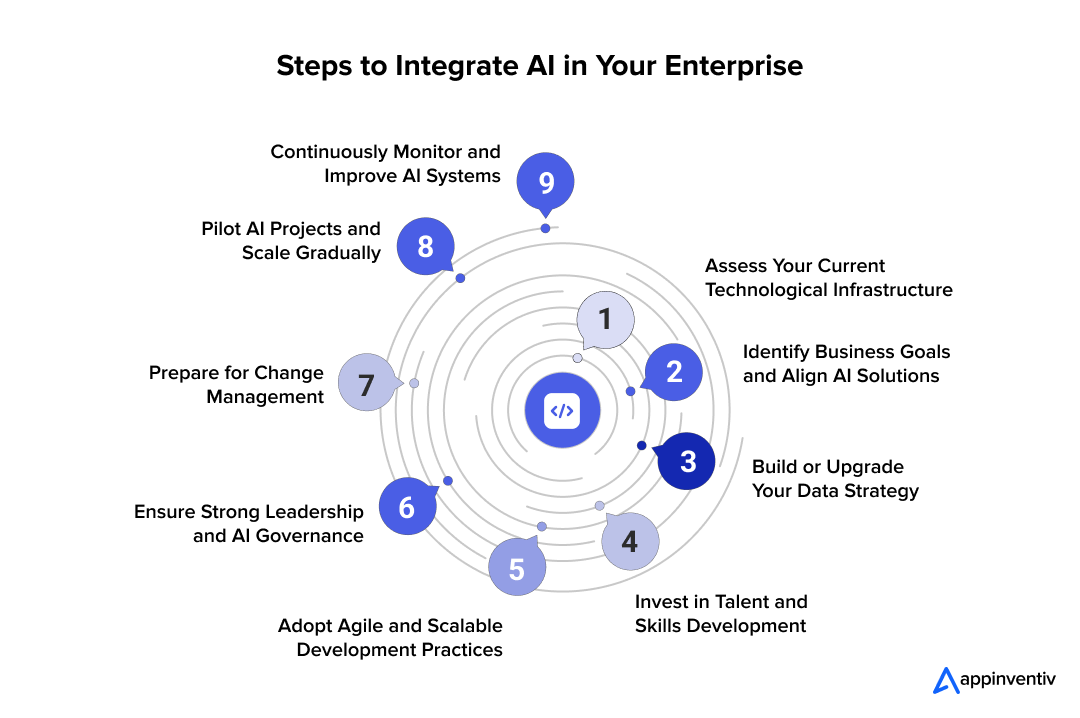
1. Assess Your Current Technological Infrastructure
Before implementing AI, your first step should be checking out your existing infrastructure. AI demands heavy-duty, scalable systems that can crunch massive datasets and handle serious computational work. A cloud-first strategy often becomes necessary since AI models need training on vast datasets, which cloud solutions handle way better.
- Check for compatibility: Do your current systems allow for seamless integration of AI tools?
- Scalability: Can your infrastructure grow with AI’s increasing demands, especially when data and computational needs explode?
Before implementing AI, your first step should be checking out your existing infrastructure, and for organizations dealing with complex data workflows, leveraging agentic AI for smarter data engineering can automate data preparation and pipeline management.
Ensuring a solid foundation matters because AI models crash and burn on outdated or incompatible systems.
2. Identify Business Goals and Align AI Solutions
What do you actually want AI to do? It could be boosting sales, fixing customer service, or streamlining operations. To make AI integration in business operations work, you must match AI solutions with your business goals.
- Define KPIs: What success metrics will show AI’s impact?
- Match AI use cases: Pick AI applications that attack your biggest business headaches.
Clear objectives make sure AI becomes a business transformation tool, not just expensive tech toys.
3. Build or Upgrade Your Data Strategy
AI lives on data. But crappy data kills AI performance. For AI to work effectively, your data must be accurate, clean, and easily accessible. Statista says the global AI market will hit $1.01 trillion by 2031, proving how crucial data is for AI success.
- Data Governance: Ensure strong policies around data collection, privacy, and security.
- Data Cleanliness: Data must be structured, labeled, and bias-free for AI models to produce useful results.
Organizations looking to maintain complete control should also explore private AI deployment strategies that keep sensitive data within their own infrastructure.
- Data Accessibility: Can AI algorithms grab the data they need instantly?
A strong data strategy has become the bedrock for AI transformation in business.
4. Invest in Talent and Skills Development
AI projects demand specialized skills. Whether hiring AI developers, training current staff, or partnering with AI services and solutions providers, make sure you have the right talent to lead AI initiatives. AI integration services can help businesses adopt AI without having all the expertise in-house.
- Skills Assessment: Do your employees have the right skills, or do they need training?
- Outsourcing: Consider hiring AI experts or partnering with AI services providers if internal resources fall short.
Building AI-ready enterprises requires commitment to developing both technical and management expertise.
5. Adopt Agile and Scalable Development Practices
AI integration is a continuous journey. To build a real AI-driven business transformation, use agile practices for iterative development and quick adaptation. Your AI models should grow with business needs, so be prepared for regular updates, testing, and improvements.
6. Ensure Strong Leadership and AI Governance
Leadership must not only be supportive but also actively involved in AI adoption. AI governance should be a top priority to ensure that AI models are transparent, ethical, and aligned with business objectives.
AI pioneer Andrew Ng famously said, “AI is the new electricity.” And just like electricity, you need safety standards. Your rulebook should cover:
- Ethics: Where do you draw lines on fairness and transparency? How do you stop your AI from making biased choices?
- Risk: What goes wrong? Data breaches? Models going crazy? Plan for disasters.
- Compliance: Make sure you’re following all the industry and government rules.
- A Champion: You absolutely need someone in the C-suite who gets it. A leader who will fight for the budget, clear roadblocks, and sell the vision is essential for a real AI-driven business transformation.
7. Prepare for Change Management
AI will change how your business operates, which is why change management is crucial. Employees must be informed and educated about how AI can improve their roles rather than replace them. This will foster employee buy-in and reduce resistance to AI adoption.
8. Pilot AI Projects and Scale Gradually
The most successful AI integrations often start with small-scale pilot projects. Once you see positive results, gradually scale AI projects across different departments and processes. Pick a project where you can clearly measure success. Let’s say it’s an AI tool to predict which customers are about to leave. Roll it out to a small team and track everything:
- Did it work? Is the model actually accurate?
- Did it matter? Did customer churn actually go down? What was the ROI?
- Did people like it? Do your customer service reps find it helpful, or is it just another annoying pop-up?
The goal here isn’t perfection. It’s learning. The lessons from this small test will be pure gold for everything that comes next.
9. Continuously Monitor and Improve AI Systems
AI is not a set-it-and-forget-it solution. Regular monitoring and improvements ensure your AI models stay effective and continue to meet evolving business needs. As AI trends and technologies advance, ongoing upgrades will keep your AI systems aligned with best practices.
Successful AI adoption begins with a solid foundation. Are you ready? Let us guide you through every step, from strategy to seamless integration.
How to Overcome Common Enterprise AI Integration Challenges
Kicking off an AI integration in business is a huge step, but let’s be real; it’s never a perfectly straight road. Knowing where the potholes are is the best way to avoid them. Here are some tried and tested tricks to overcome the challenges in AI integration:
| Challenge | Solution | Why It Matters |
|---|---|---|
| Data Quality and Availability | Clean up and organize your data before rolling out AI. | AI needs good data to work. Quality, structured info helps models give you useful insights. |
| Legacy Systems Compatibility | Pick AI tools that play nice with your current setup. | Skip unnecessary overhauls; compatibility keeps adoption smooth without breaking existing operations. |
| Lack of Skilled Talent | Train current employees or bring in outside AI experts. | AI projects need specialized know-how; right talent makes implementation actually work. |
| Leadership Buy-In | Get key stakeholders involved early and aligned with AI goals. | Executive backing drives resources, focus, and project success across departments. |
| Scalability of AI Solutions | Start with pilot projects, then expand gradually based on what works. | Scalability lets your AI solution grow with business needs while avoiding implementation disasters. |
| Change Management | Get employees ready through proper training and communication. | Building innovation culture cuts resistance and speeds up AI adoption. |
| Cost of AI Implementation | Plan budget for long-term expenses, including tools and training. | Smart budgeting keeps your AI investment sustainable and supports growth over time. |
| Data Privacy and Compliance | Stay compliant with regulations like GDPR, HIPAA, etc. | AI solutions must follow data privacy laws to dodge legal trouble and protect sensitive info. |
Maximize AI Readiness & Integration in Your Enterprise with Appinventiv’s Excellence
Business world embraces AI, but the real challenge for enterprises isn’t wanting to adopt AI; it’s getting truly prepared for it. At Appinventiv, we help enterprises:
- Assess AI readiness and weave a custom roadmap
- Clean, govern, and unlock the full value of your data
- Integrate AI as a feature within existing workflows
- Avoid vendor lock-in with open, future-proof solutions
- Operationalize pilots and scale for real business impact
With over 10+ years of experience and proven history delivering more than 3000 projects, including 300 AI-powered solutions, Appinventiv stands as your ideal partner for delivering next-gen AI Services and Solutions
We get that each industry has distinct challenges, and the custom AI solutions we build are designed to meet those specific needs precisely. Our successful AI-driven projects show our unmatched excellence and expertise in this regard. Below are some examples of how we transformed businesses with state-of-the-art AI solutions:
- Vyrb – AI-powered Social Media App
We helped Vyrb create a social media app using AI to personalize content and boost user engagement. This voice assistant app helps users enjoy an uninterrupted social media experience even on the go. - Mudra – AI-driven Budgeting App
Our tech experts developed Mudra, a budget management app that uses AI to track spending and provide personalized financial insights. The app analyzes spending patterns, enabling users to make more informed financial decisions.

- Flynas – AI-Enhanced Airline App
Our team developed Flynas to deliver a personalized travel experience by implementing AI for smarter flight recommendations and efficient routing, making the app more user-friendly and travel-friendly. - JobGet – AI-based Job Search Platform
We developed JobGet, which uses AI to match job seekers with the right opportunities by analyzing candidates’ profiles. This platform significantly streamlines the recruitment process while improving candidate experience.
Our extensive AI service offerings include:
- Enterprise-grade AI Consulting & Strategy Development
- AI Readiness Assessment
- AI Solutions Development
- AI Model Development
- Enterprise AI Integration Services
- Legacy System Transformation with AI
- AI Maturity Assessment and Roadmap
With our suite of AI consulting services, we help your business unlock significant efficiencies, drive innovation, and provide exceptional customer experiences. Our AI readiness and implementation process is designed to ensure seamless integration and measurable results.
With Appinventiv’s expertise, your enterprise can fully embrace the AI-powered future. Get in touch with us today to explore how we can transform your business through next-gen AI solutions.
FAQs
Q. What are the first steps in integrating AI into an enterprise?
A. There are several steps to prepare for AI implementation. However, the absolute first step is to pinpoint a real, nagging business problem you want to solve. Before looking at any technology, define what success looks like in measurable terms (e.g., reduce operational costs by 20%). That clear goal becomes the North Star for your entire enterprise AI integration plan.
Q. How can AI integration improve enterprise operations?
A. AI integration in business operations can be a game-changer across the company. It’s not just one thing; it’s a bunch of improvements that add up. Think of it like this:
- Eliminating repetitive tasks: AI handles the mundane, repetitive work, allowing your team to focus on more creative, high-value activities.
- Making better decisions: AI provides predictive insights, so key business decisions are grounded in data rather than intuition alone.
- Personalizing customer experiences: AI enables large-scale personalization, ensuring each customer feels understood and valued.
- Optimizing complex systems: It can optimize monster processes like supply chain logistics that are just too complicated for a human to juggle alone.
Q. What are the best practices for AI integration in large businesses?
A. For large organizations, AI integration can be challenging due to the complexity of existing structures. To successfully implement AI, focus on the following:
- Secure executive sponsorship: Ensure senior leadership is on board to champion the project, remove obstacles, and maintain momentum.
- Achieve early wins: Start with a small pilot project that demonstrates AI’s value, creating excitement and buy-in from stakeholders.
- Establish a cross-functional team: Assemble a dedicated “Tiger Team” with representatives from both business and technical sides to ensure alignment.
- Prioritize data quality: Clean, well-structured data is essential. Make it a top priority to ensure your AI models perform at their best.
- Plan for change management: Don’t forget the human side. A real change management plan is non-negotiable to help your employees adapt.
Q. How do I prepare my enterprise for AI integration?
A. Preparing your enterprise for AI adoption really comes down to getting your house in order. It’s a mix of tech, strategy, and people. Here’s the checklist:
- Check your foundation: Make sure your tech and data infrastructure can actually handle the demands of AI.
- Know your ‘why’: Tie every single AI idea back to a clear business goal. If you can’t, don’t do it.
- Invest in your staff: You’ll need to train your current team and likely hire some new talent.
- Set the rules of the road: Create a clear framework for ethics and governance so everyone knows how to use AI responsibly.
- Start small: Start with a small, manageable pilot project before you try to change the whole company.
Q. How can Appinventiv assist in AI integration for my enterprise?
A. Think of us as the seasoned guide on your AI expedition. We’re not just coders; we’re strategists who roll up our sleeves. We help you map out your enterprise AI integration strategy, get your data ready for prime time, and then build and deploy the custom AI tools that fit your business like a glove.
We’re especially skilled at the challenging part: ensuring seamless enterprise AI integration with existing systems.
Q. What are the potential ROI benefits of AI for my enterprise?
A. The return on investment for AI isn’t just a single number; it comes from several places at once. You’ll see the payoff in areas like:
Cost savings: Though the initial cost of AI integration in enterprises is substantial, AI reduces time and money spent on manual, repetitive tasks.
Revenue growth: With better marketing strategies, more accurate sales forecasts, and upselling opportunities, AI boosts your bottom line.
Improved customer retention: AI-driven enhancements to the customer experience foster loyalty and increase retention.
Avoiding costly mistakes: AI helps with fraud detection and predictive maintenance, preventing expensive issues before they arise.
Q. How do I ensure that AI implementation aligns with our business objectives?
A. It’s crucial to keep AI on track with your business goals. Think of it like steering a ship: you can’t just set a course and forget about it. Tie every AI initiative to a key performance indicator (KPI) that matters to your business
Then, gather a small group of stakeholders from business and IT to check in regularly and ensure you’re still on the right path. If business goals shift, your AI priorities must be agile enough to shift in tandem with them.


- In just 2 mins you will get a response
- Your idea is 100% protected by our Non Disclosure Agreement.

Data Mesh vs Data Fabric: Which Architecture Actually Scales With Business Growth?
Key takeaways: Data Mesh supports decentralized scaling, while Data Fabric improves integration efficiency across growing business environments. Hybrid architectures often deliver flexibility, governance, and scalability without forcing premature enterprise-level complexity decisions. Early architecture choices directly influence reporting accuracy, experimentation speed, and future AI readiness across teams. Phased adoption reduces risk, controls costs, and allows architecture…

Governance vs. Speed: Designing a Scalable RPA CoE for Enterprise Automation
Key takeaways: Enterprise RPA fails at scale due to operating model gaps, not automation technology limitations. A federated RPA CoE balances delivery speed with governance, avoiding bottlenecks and audit exposure. Governance embedded into execution enables faster automation without introducing enterprise risk. Scalable RPA requires clear ownership, defined escalation paths, and production-grade operational controls. Measuring RPA…
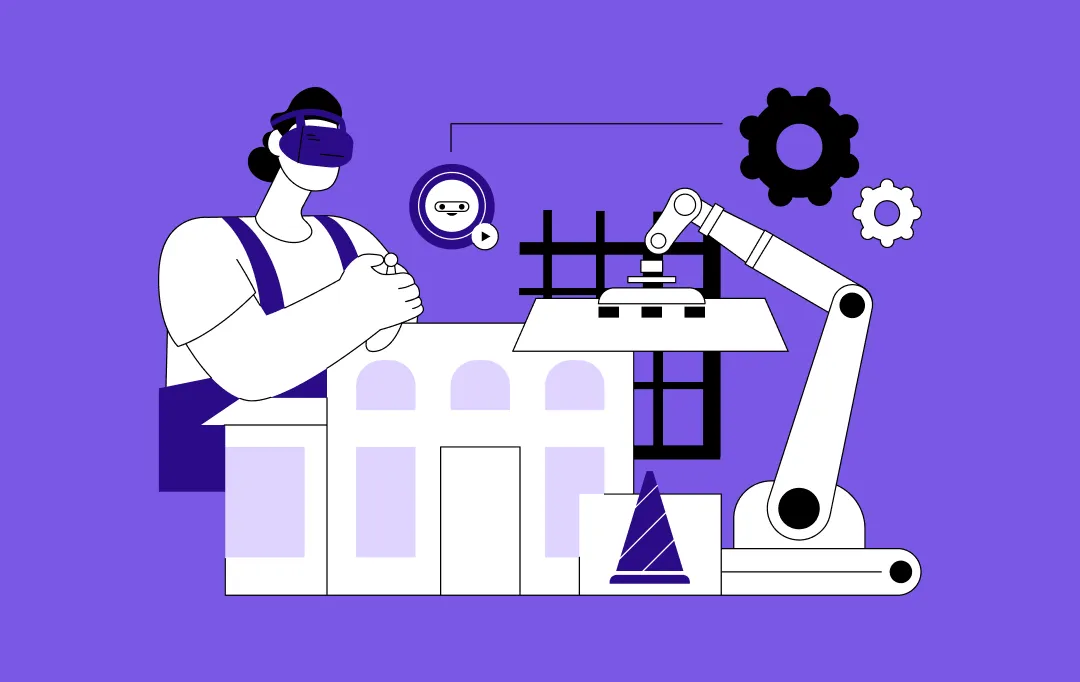
How AI Overhauling Industrial Automation in Australia
Key takeaways: AI is shifting industrial automation from rule-based to data-driven decision ecosystems Predictive and autonomous operations are improving efficiency and cost optimisation Australian industries are leveraging AI to solve workforce, sustainability, and compliance challenges Enterprises adopting AI early gain competitive, operational, and economic advantages Industrial automation in Australia is no longer just an engineering…


























